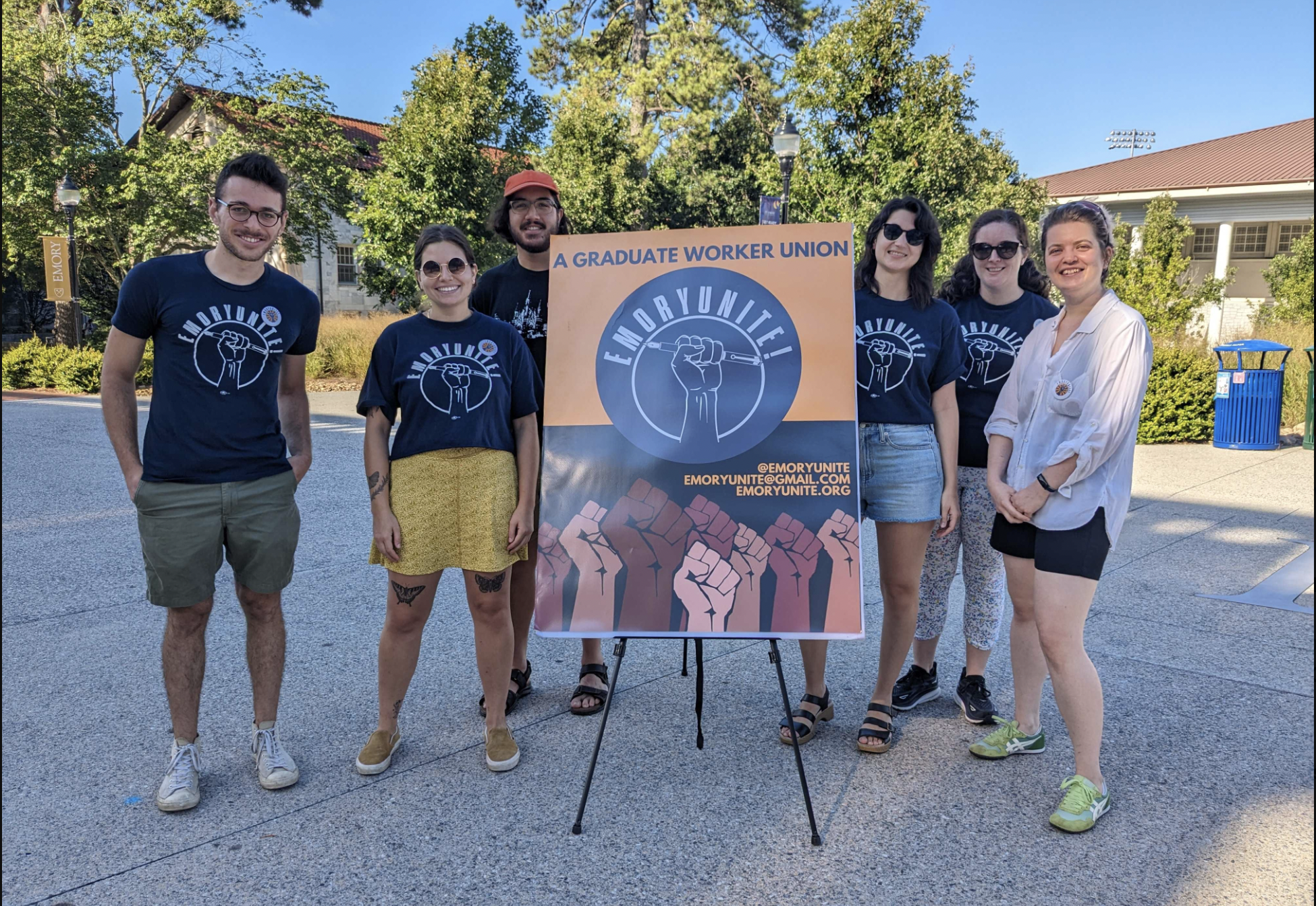In a historic development, EmoryUnite! has petitioned for a union election with the National Labor Relations Board to represent 1,722 graduate-student workers at Emory University. If a majority vote to unionize, they’ll become the first union of graduate workers in Georgia.
According to EmoryUnite! organizers, over half of Emory’s Ph.D. grad student workers at the Laney Graduate School actively support a union. To qualify for an NLRB election, at least 30% of eligible employees must sign union cards. EmoryUnite! filed the election petition on Aug. 25 and now awaits the NLRB to schedule an election.
“Emory graduate-student workers need a union to have a tangible and consistent way to advocate for better pay, benefits, and working conditions,” said EmoryUnite! organizer Nathan Goldberg, a third year Ph.D. candidate in art history program.
“At the height of COVID-19 in the summer of 2021, for instance, Emory increased the annual insurance premiums for dependents by more than $1,000 per dependent,” Goldberg said. “Without a union, we are subject to the ad-hoc decision-making of the administration, meaning our working conditions and benefits can change at a moment’s notice.”
If EmoryUnite! wins the election, it will join the Service Employees International Union (SEIU) as the graduate worker’s bargaining unit for Emory. At that point, the university’s administration would be required by law to negotiate with it over pay, benefits and working conditions – but it could still take the graduate worker union another year or more to win a contract.
The chances of unionizing are auspicious for the Emory graduate students, based on recent wins at other universities. Graduate worker unions have won 24 out of their last 25 NLRB elections – most recently at Duke University in Durham, North Carolina. Blue Devil grad students won their union election on Aug. 22, making Duke the first private university in the South where graduate workers are unionized.
That followed union wins earlier this year by grad workers at high-profile schools such as Yale, Northwestern, and Johns Hopkins.
What’s more, the number of graduate worker unions has increased sharply – by fully 56% – since 2021, thanks to an NLRB ruling that year which finally classified graduate workers at private universities as employees. Graduate workers at public institutions already were deemed employees, so union-eligible. (The NLRB initially made the ruling for private universities in 2016, but it was quickly reversed under the Trump administration.)
At the end of 2021, there were 54 graduate worker unions. After the NLRB’s ruling, that figure had jumped to 84 as of July, according to an database tracking grad student unionizing efforts from Washington University in St. Louis.
Organizing the South
Historically, private colleges and universities, especially in the South, have been tough places to form a union. University administrators typically resist graduate workers’ efforts to unionize, saying they are apprentices training for a career in academia – not employees.
On top of that, Southern states have right-to-work laws, which say employees in a unionized workplace don’t have to pay union dues. Consequently, labor unions are more rare and less powerful in the South, compared with the 27 states where workers in a unionized shop must pay union dues.
Since the NLRB’s 2021 ruling allowing grad students at private universities to unionize, a renewed unionization wave has swept through academia. Starting in 2022, nearly 75% of new grad worker unions and all of the undergraduate ones have formed at private colleges and universities, according to a report from the CUNY School of Labor and Urban Studies.
Emory graduate workers have been trying to organize for six years – since the initial 2016 NLRB decision clearing the way for graduate students at private universities to unionize. That’s also when Duke’s graduate union started its long fight to gain NLRB recognition, culminating in its Aug. 22 election win.
“The [NLRB] decision to approve the petition for the [Duke graduate union] was a major turning point for Ph.D. students at private universities in the South and bodes well for our own unionization effort,” said EmoryUnite!’s Goldberg.
Emory’s response
Emory’s administration says it will “honor and respect our students’ right to engage in dialogue about union representation,” according to an Aug. 29 statement from Provost Ravi Bellamkonda and a FAQ on the university’s website. (EmoryUnite! has its own FAQ.)
But for EmoryUnite!’s previous union campaign in 2017, the Emory administration actively discouraged graduate students from doing so.
“We do not believe that a union would add value here at Emory,” wrote Lisa Tedesco, the Laney Graduate School dean at the time. “Emory’s position is that graduate students teach and do research as part of their graduate education — it’s part of their professional development … Graduate students are not employees.”
For the current school year, the minimum stipend that Emory pays its grad students for teaching and other duties is $36,376. That’s below what’s considered a living wage in Atlanta, where the typical two-bedroom rental costs $1,664 a month. (Emory covers tuition, which it values at $70,200 annually.)
The rest of grad workers’ paychecks are quickly eaten up by other basic living expenses, Goldberg said. “Ph.D. students at Emory spend over half their monthly pay on housing alone, 15% of their yearly pay on health insurance for one child, and a third of their yearly pay for their child and spouse.”
Courtney Rawlings, EmoryUnites’ former president, is no longer a grad student, but says she’s excited the group has finally achieved the union election. The NLRB has not yet scheduled the election.
“Organizing in the South is an uphill battle, but the graduate workers at Emory show what’s still possible when workers come together,” she said.
For further reading, here’s a story from the Emory Wheel, the university’s student-run newspaper.


